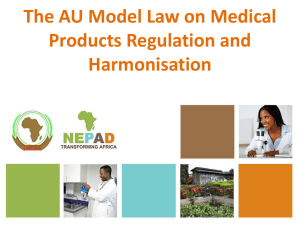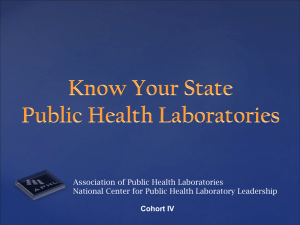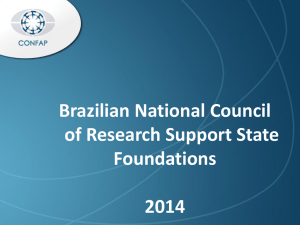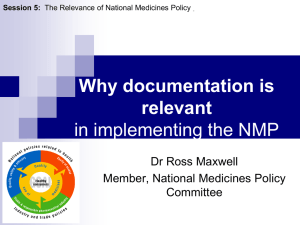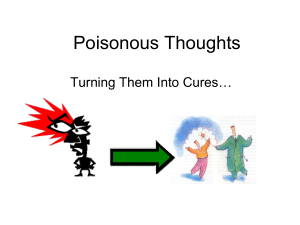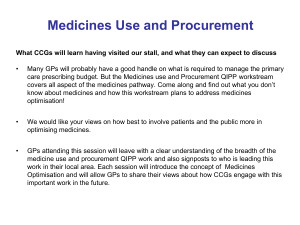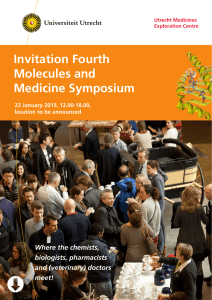Partnership for the productive development_E.Pinheiro
advertisement
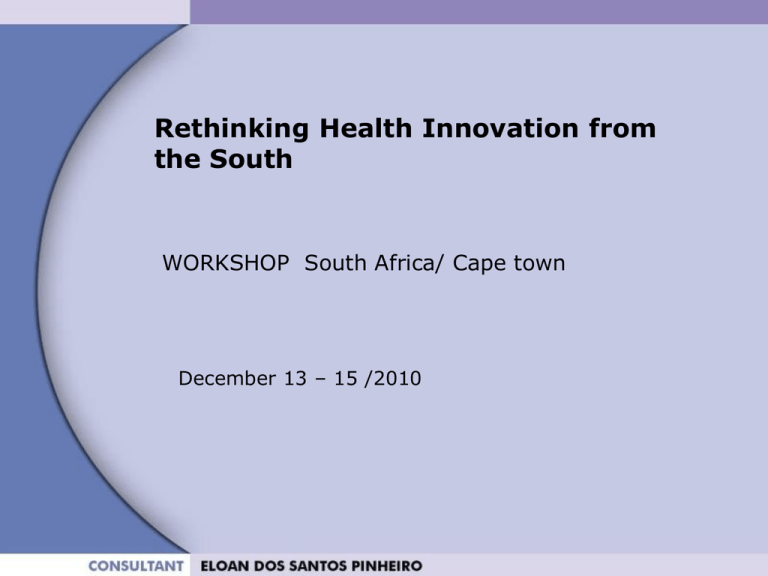
Rethinking Health Innovation from the South WORKSHOP South Africa/ Cape town December 13 – 15 /2010 Partnership for the productive development (PDP). The social responsibility of the State in order to ensure the public health requires: • strong government intervention in medicine availability policy throughout all the chain for producing medicines, such as: • Producing the chemical Intermediaries, APIs and finished formulations. This premise and necessity have driven the Brazilian Government to insert the field of Health in the Growth Acceleration Program (PAC). All the Chain for producing medicines • Laboratory fase 2. Industrial pilot Gram/ 1 kg product 15/ 20 kg product All steps should be conducted with GMP and GLP. Industrial Production ICT Technological Unit Or Manufactures Objectives of this program: • Reducing the vulnerability of the social Brazilian policy on health: To achieve this objective is important to strengthen the Industrial and Innovation Complex in Health, associating and aligning the productive capacity with the pillars of the National Policy of Health defined in the scope of the SUS (Unified Health System). • Increasing the competitiveness of public and private laboratories in the context of the Industrial Complex of Health. To accomplish this objective it is necessary to give to public and private laboratories conditions by which they are capable for facing the competition with products available on the international market. These conditions may be summarized as follows: (1) strengthening their capacity in reverse engineering and innovation of Drugs and Medicines (2) promoting a robust process of substitution of imported products used in health prophylaxis and treatment; (3) giving priority to the substitution of products which involve major density in knowledge and are essential to meet the health needs of the Brazilian population To fulfill these objectives, several governmental decrees were launched, for example: • Jointly-Ministries decree No. 128/08 • Ministry of Health decree No. 3031/08 • Presidential Decree No. 5.813/06 • Ministry of Health decree nº 978/08 -This degree was reviewed on May 2010 Agreement for the Development of Medicines Production. Partnerships between public laboratories and private producers of medicines and drugs were implemented in order to achieve the goals of the Productive Development Policy (PDP) and the following objectives: •Strengthening public health laboratories and expanding its role in the market regulation; •Encouraging local production of high cost and / or major health and social impacting APIs or medicines; •Supporting the development of the productive capacity of the national pharmochemical industry; •Implementing a representative industry of phytochemicals by taking advantage of the great Brazilian genetic patrimony. Current Status The partnerships had clear rules and are monitored by MoH. Role of each actor in the process. •Ministry of Health: Establishes agreements with Public Laboratories , for five years, with price reduction of 5% per year, ensuring market to the manufacturer in this period. •Public Laboratory: 1) Hire private pharmaceutical company for developing the pharmaceutical formulation. It should be produced by the public laboratory within two years. 2) Establishes agreements with a chemical-pharmaceutical laboratory aiming the local production of the APIs. •Private Chemical-Pharmaceutical Laboratory Establishes, if necessary, an agreement with an international producer for manufacturing APIs. Local production of API should be in routine after two years. Monitoring and Evaluating the developing and manufacturing process. To accomplish this policy, the Brazilian Government created a task force comprising: • External consultants having expertise in the required field. • Public expert employees from the MoH • Public expert employees from NDRA (National Drug Regulatory Agency) All projects are quarterly evaluated by the group on the ongoing progress of each Partnership in the Development and Production Process. Outcomes: In 2009-2010, twenty partnership for developing and producing priority medicines were established. These twenty partnerships involve 25 products, 9 public laboratories, 17 private industries (10 national laboratories and 7 international laboratories). Annual expense with those medicines are around R$ 1,200 billion of Reais, it is equivalent to USD 600 million of dollars with potential saves of R$ 250 million of Reais, it is equivalent to USD 125 million of dollars. Priority projects ongoing: Product Public Lab Taliglucerase alfa 200UI Private Lab Private pharmochemica l Lab Disease Biomanguinho Pfizer/Proalix s Pfizer Gaucher Betainterferona 1a Biomanguinhos Aché Ache multiple sclerosis Formoterol+ Budesonida Farmanguinhos ChemoLiconsa( Spain) Nortec Asthma Sirolimus Farmanguinhos Libbs Libbs Imuno supressor Tacrolimus Farmanguinho Libbs s Libbs imunosupress or RIPE Farmanguinhos ???? tuberculostatic Lupin Priority projects ongoing: Product Public Lab Private Lab Private pharmochemica l Lab Disease Donezepil Furp/Funed Cristália Cristália Alzheimer Entecavir Funed Microbiologica Microbiologica Hepatite B DIU Furp Ingelflex ------ Dispositivo intrauterino Octreotida IVB Hygea Hygea Inhibitor of growth hormone Rivastigmina IVB Laborvida Norte Alzheimer Micofenolato de Mofetil Lafepe Roche Nortec Rejection in transplant Priority projects ongoing: Product Public Lab Private Lab Private pharmochemica l Lab Disease Raloxifeno Public Laboratory Blanver Nortec osteoporosis Ziprasidone Public Laboratory Laborvida NPA/Hetero schizophrenia Projects in the NRDA for Register: Product Public Lab Private Lab Private pharmochemi cal Lab Disease Quetiapine Lafepe Cristália Cristalia antipsychotics Olanzanpine Lafepe Cristália Cristália antipsychotics Olanzanpine Lafepe Cristália Cristália antipsychotics Tenofovir Funed /Lafepe Balnver/Crist ália Cristália antiretroviral Projects in negotiation between the partners Product Public Lab Private Lab Private pharmoche micaLab Disease Atazanavir Lafepe and Farmanguinhos BMS Nortec and Cristalia Antiretroviral Raltegravir Lafepe and Farmanguinhos Merck Nortec and Cristália Antiretroviral Acknowledgment : Fernanda Macedo email: macedo.rf@gmail.com Thank you Eloan Pinheiro email: eloan@infolink.com.br

